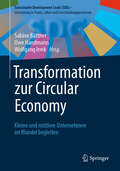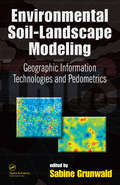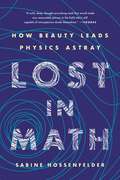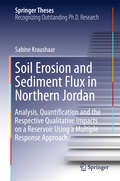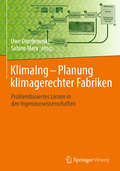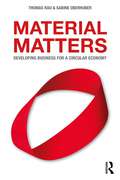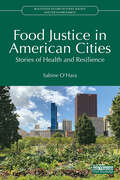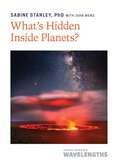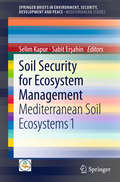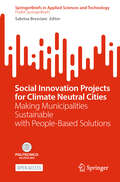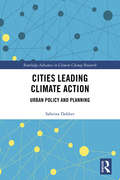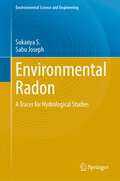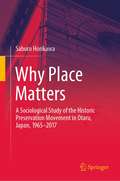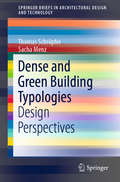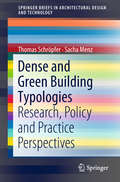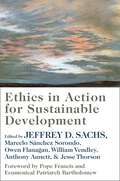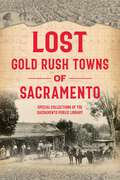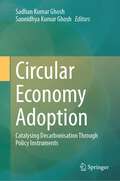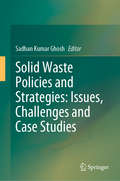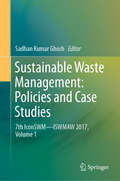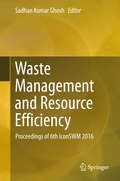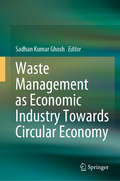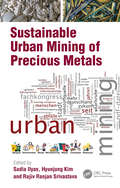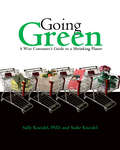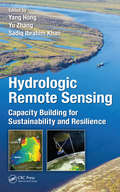- Table View
- List View
Transformation zur Circular Economy: Kleine und mittlere Unternehmen im Wandel begleiten (Sustainable Development Goals (SDG) – Umsetzung in Praxis, Lehre und Entscheidungsprozessen)
by Sabine Büttner Uwe Handmann Wolfgang IrrekIn den Beiträgen dieses Buches werden Herangehensweisen, Werkzeuge und Erfolgsfaktoren für die Sensibilisierung und den Wissenstransfer ebenso wie technische Verfahren und Good-Practice-Beispiele vorgestellt, wie sie im Projekt „Prosperkolleg – Transformationsforschung zur zirkulären Wertschöpfung“ entwickelt und exemplarisch in der Region Emscher-Lippe und darüber hinaus in NRW erprobt werden konnten. Flankiert werden diese umsetzungsbezogenen Darstellungen durch Hintergründe zum Konzept der Circular Economy und ihrer Potentiale sowie Trends der wissenschaftlichen Forschung und die Reflexion weiterer Transformationsperspektiven.
Environmental Soil-Landscape Modeling: Geographic Information Technologies and Pedometrics
by Sabine GrunwaldEnvironmental Soil-Landscape Modeling: Geographic Information Technologies and Pedometrics presents the latest methodological developments in soil-landscape modeling. It analyzes many recently developed measurement tools, and explains computer-related and pedometric techniques that are invaluable in the modeling process.This volume provi
Lost in Math: How Beauty Leads Physics Astray
by Sabine HossenfelderA contrarian argues that modern physicists' obsession with beauty has given us wonderful math but bad science Whether pondering black holes or predicting discoveries at CERN, physicists believe the best theories are beautiful, natural, and elegant, and this standard separates popular theories from disposable ones. This is why, Sabine Hossenfelder argues, we have not seen a major breakthrough in the foundations of physics for more than four decades. The belief in beauty has become so dogmatic that it now conflicts with scientific objectivity: observation has been unable to confirm mindboggling theories, like supersymmetry or grand unification, invented by physicists based on aesthetic criteria. Worse, these "too good to not be true" theories are actually untestable and they have left the field in a cul-de-sac. To escape, physicists must rethink their methods. Only by embracing reality as it is can science discover the truth.
Soil Erosion and Sediment Flux in Northern Jordan
by Sabine KraushaarThis book combines new quantitative erosion measurement methods with a geochemical fingerprint and a model-based approach to measure erosion and sediment flux in the Wadi Al-Arab, a Mediterranean to semi-arid catchment in northwest Jordan. The outcomes reveal the local importance of soil erosion and sediment yield in connection with sedimentation and pollution of surface water bodies, propose managed aquifer recharge strategies that focus on in-channel constructions, and can be used to support local soil management strategies. In Jordan, one of the most water scarcity-affected countries in the world, erosion and sedimentation negatively impact integrative water resource management projects, such as water reservoirs and groundwater recharge basins. This book combines a multiple-response approach with new qualitative methods, such as olive mound measurements and OSL dating of Roman cistern sediments, to obtain long-term average erosion rates in the Mediterranean to semi-arid Wadi Al-Arab catchment in northwest Jordan. The implementation and enhancement of a geochemical sediment fingerprint of the reservoir sediments helped to provide new insights on sediment connectivity. Lastly, the outcomes were compiled and tested in the SedNet model, which provides a more holistic view of the results at the catchment scale and can effectively complement local management strategies.
KlimaIng - Planung klimagerechter Fabriken: Problembasiertes Lernen In Den Ingenieurwissenschaften
by Uwe Dombrowski Sabine MarxDie mit dem Klimawandel verbundenen Risiken haben auch Konsequenzen für produzierende Unternehmen und ihre Produktionsstätten. Daher widmet sich das Buch der klimagerechten Planung von Fabriken und verknüpft dieses ingenieurwissenschaftliche Fachgebiet mit Grundlagenwissen zur Planung und Durchführung problembasierter Lehrveranstaltungen an Hochschulen. Im ersten Teil beschreiben die Autoren die Grundlagen des Klimawandels und der Fabrikplanung. Sie stellen zum einen die Vorgehensweisen zur Identifizierung von Klimarisiken und zum anderen Planungsansätze zu deren Reduzierung vor. Der zweite Teil verknüpft diese ingenieurwissenschaftlichen Aufgabenstellungen mit dem Konzept problembasierten Lernens. Dabei wird problembasiertes Lernen als Lehrmethode zum Erwerb und zur Anwendung praxisrelevanten Fachwissens verstanden, die stets die Lernenden in den Mittelpunkt stellt. Neben theoretischen Grundlagen und aktuellen Forschungsergebnissen zur Wirksamkeit problembasierten Lernens erhalten Leser hier auch Hinweise für die Implementation in der Praxis. Am Beispiel einer problembasierten Lehrveranstaltung, die im Rahmen eines Forschungsprojektes entwickelt wurde, wird eine didaktische Konzeption zur Planung und Durchführung problembasierter Lernumgebungen vorgestellt. Diese Modell-Lehrveranstaltung ist so aufbereitet, dass das Konzept ohne viel Aufwand auf andere Themengebiete der Ingenieurwissenschaften übertragen werden kann. Der dritte Teil des Buchs bietet eine Fallsammlung zu unterschiedlichen Lernzielen. Diese dienen Nutzern als Vorlage, um selbst geeignete Fälle für problembasierte Lernumgebungen zu konstruieren. Das Buch richtet sich an Lehrkräfte in ingenieurwissenschaftlichen Studiengängen, insbesondere solche mit dem Schwerpunkt Klimawandel und Fabrikplanung.
Material Matters: Developing Business for a Circular Economy
by Thomas Rau Sabine OberhuberOur planet is a closed system with limited material resources, yet our current economic model is designed in a one-way direction from resource extraction to disposal, leading to resource depletion. This book proposes a new economic model, offering an alternative to this linear ‘take-make-waste’ economy. Material Matters shows a way of creating a circular economy by using the unlimited resources we have: renewable energy, data and intelligence. It describes a system based on circular business models centred on selling performance rather than ownership, designing products and buildings as resource banks and equipping products with a ‘material passport’ to ensure their usability for future generations. Businesses thereby become custodians of materials, rather than consumers of materials and sellers of products. The book evokes the vision of a radically new economic model based on a compelling narrative, supported with cases that have been developed in conjunction with major companies, for example, convincing Philips to sell light instead of lamps, saving energy and materials by creating a whole new business model, a case which has become iconic for the circular economy. Material Matters is not a somber analysis of the state of the planet but a concrete and comprehensive agenda for change, offering perspectives for taking action for business and individual consumers alike.
Food Justice in American Cities: Stories of Health and Resilience (Routledge Studies in Food, Society and the Environment)
by Sabine O’HaraThis book documents food insecurity in urban communities across the United States and asks whether emerging urban food and agriculture initiatives can address the food security needs of American city dwellers. While America has sufficient food to feed its entire population, 38 million people are food insecure, with urban communities and communities of color having long borne the brunt of food inequalities. This book traces the evolving story of food by describing the people behind food system statistics, focusing on cities and suburban communities across America. In doing so, it raises questions not only about food security but about a food economy that can foster justice and sustainability and combat hunger and waste. By linking human faces to the data, the book reveals the many connections between food insecurity and unsustainable practices. The book concludes by discussing some of the pathways toward a more sustainable and just food system by linking the food system to the larger economy and the many sectors that are connected to food. Because of these multifaceted connections, food can be a unique catalyst for creating pathways toward a more just and sustainable economy that is more aligned with nature. This book will be of great interest to students and scholars of food justice, food security, urban food and agriculture, urban sustainability, and sustainable food systems more broadly.
Soil Security for Ecosystem Management: Mediterranean Soil Ecosystems 1
by Sabit Erşahin Selim KapurThe term "Soil Security" is used in the context of maintaining the quality and quantity of soil needed in order to ensure continuous supplies of food and fresh water for our society. Topics in this unique book on the management of soil sustainability in the Mediterranean region include: soil information, land degradation, land desertification, pedoenvironments, and the carbon cycle and sequestration. One main focus of the book is the description of new approaches that have been adapted with regards to interdisciplinary soil ecosystem management to combat and mitigate desertification. The contributing authors are renowned experts in their fields which cover the subjects on traditional as well as innovative land use and management.
Social Innovation Projects for Climate Neutral Cities: Making Municipalities Sustainable with People-Based Solutions (SpringerBriefs in Applied Sciences and Technology)
by Sabrina BrescianiThis open access book examines the role of social innovation in cities as an important lever towards climate neutrality. Social innovations are people-centred collaborative solutions, activating the urban ecosystem for change and providing platforms for citizens, civic organizations, the private sector, and governmental institutions to collaborate towards the goal of reducing greenhouse gas (GHG) emissions. The book, based on work developed within the EU-funded project NetZeroCities, which aims to support over 100 European cities to be climate-neutral by 2030, outlines methods, cases, and pathways of social innovation in Europe. It presents social innovation design process pathways through methods, categories of actions, and related cases for developing and scaling social innovations at the urban level, contributing to a systemic approach to tackle the grand challenge of reaching net zero. Within these pages, researchers and policymakers can find examples of cities that have deployed innovative public administration practices by systemically embedding social innovation in varied fields of urban action plans, including energy, citizen engagement, and behavioural change for lowering carbon emissions and increasing well-being.
Cities Leading Climate Action: Urban Policy and Planning (Routledge Advances in Climate Change Research)
by Sabrina DekkerThis book provides local governments and interested stakeholders with insights into the challenges and opportunities inherent in addressing climate change. Drawing on in-depth case study research on Vancouver, Portland, Glasgow and Dublin, Dekker examines the policy development processes employed by urban policy makers to respond to climate change, looking specifically at the utilisation of collaborative planning. Emerging from the case studies are lessons for local governments in relation to the role of organisational structure in supporting climate leadership; the importance of leadership, trust, relationship building and narratives for supporting ownership of the responses to climate change by stakeholders; and the need for creative and innovative public engagement to expand the reach of traditional methods such as social media and other technology-based solutions. Finally, Dekker reflects on her experience in the development of climate change action plans for the Dublin Local Authorities. This book will be of great relevance to students, scholars and policy makers with an interest in climate change resilience, environmental policy and urban planning.
Environmental Radon: A Tracer for Hydrological Studies (Environmental Science and Engineering)
by Sukanya S. Sabu JosephThis book presents state-of-the-art techniques on radon (222Rn) in the environment, including measurement techniques in air, soil and water and its potential applications to various hydrological investigations, especially for water resources development and management. The future directions of its use are also discussed.As a radon tracer can be used to solve hydrological issues, the highlights of this book are useful for stakeholders to achieve UN Sustainable Development Goal 6, which addresses the sustainability of water resources. The most relevant target audiences are hydrologists, hydrogeologists, geologists, environmental scientists, nuclear physicists, hydraulic engineers and academicians, among others. This book also covers health implications of radon and mitigation strategies, thus creating a valuable resource for health physicists working on environmental radiation safety as well.
Why Place Matters: A Sociological Study of the Historic Preservation Movement in Otaru, Japan, 1965–2017
by Saburo HorikawaThis book is based on the author’s 33 years of intensive fieldwork. It chronicles a major movement that shaped the preservation policy in Japan in the 1980s and 1990s, providing “thick descriptions” of preservationists that are not available anywhere else in English. It also provides clear answers to a series of pressing questions about preservationists: are they building-huggers, are they selfish and myopic home-owners, or are they merely obstacles to urban planning and urban renewal? Since 1984, Saburo Horikawa, Professor of Sociology at Hosei University in Tokyo, has continuously studied the movement to preserve the Otaru Canal in Otaru, Japan. This book shows that the preservation movement was neither conservative nor an obstacle. Rather, the movement sought to promote changes in which the residents’ “place” would continue to be theirs. As such, the word “preservation” does not mean the prevention of growth and development, but rather its control. As is shown in this study, preservation allows for and can even promote change. The original Japanese version of this book (published by the University of Tokyo Press) has won 3 major academic awards; most notably, “The Ishikawa Prize”, the highest award bestowed by the City Planning Institute of Japan. It is extremely unusual that a sociology book should receive such important recognition from the city planning discipline.
Dense and Green Building Typologies: Design Perspectives (SpringerBriefs in Architectural Design and Technology)
by Thomas Schröpfer Sacha MenzIn this book, leading architects and landscape architects provide their perspectives on the design of dense and green building types in high-density urban contexts that can support higher population densities, higher standards of environmental sustainability and enhanced liveability in future cities.
Dense and Green Building Typologies: Research, Policy and Practice Perspectives (SpringerBriefs in Architectural Design and Technology)
by Thomas Schröpfer Sacha MenzIn this book, academics, policy makers, developers, architects and landscape architects provide a systematic review of the environmental, social, economic and design benefits of dense and green building types in high-density urban contexts and discuss how these can support higher population densities, higher standards of environmental sustainability and enhanced live ability in future cities.
Ethics in Action for Sustainable Development
by Sachs, Jeffrey D.; Sorondo, Marcelo Sánchez; Flanagan, Owen; Vendley, William; Annett, Anthony; Thorson, JesseThe Sustainable Development Goals, adopted by the United Nations in 2015, comprise an ambitious and sweeping agenda that unites economic, social, and environmental aims. What resources do the world’s religious and secular traditions offer in support of these objectives? Which principles do these traditions hold in common, and how can these shared values help advance global goals?This book presents an in-depth and deeply engaged conversation among interfaith religious leaders and interdisciplinary scholars and practitioners in pursuit of an ethical consensus that could ground sustainable development efforts. Drawing on more than two years of close-knit discussions convened by Jeffrey D. Sachs and Marcelo Sánchez Sorondo, it offers an extensive and inclusive vision of how to promote human flourishing. The book features theological, philosophical, and ethical deliberations of great diversity and depth on the challenges of sustainable development, addressing questions of poverty, environmental justice, peace, conflict, and the future of work. It includes consensus statements on the moral imperatives of sustainable development, introductions to seven major religious traditions and their conceptions of the common good, and thematic reflections. Wide-ranging and urgent, this book represents a major contribution to interreligious dialogue and to the articulation of a shared global ethics.The book features a foreword by Pope Francis and Ecumenical Patriarch Bartholomew.
Lost Gold Rush Towns of Sacramento (Lost)
by Sacramento Public Library AuthorityThe Cannibal CityIn the early days of the California Gold Rush, Sacramento City had several competing towns vying for the influx of newcomers. Many of its rivals not only had vibrant multicultural communities but also enjoyed superior geography for transportation and flood control. Even the initial land grant from Johann Sutter is considered controversial if not downright fiction, yet Sacramento thrived where others failed. Once-bustling Mormon Island was initially the proposed site of the railway that would end up bypassing it, and Brighton became a hotbed of agitation after the deadly “Squatters’ Riot,” leading to its decline. Hoboken, Prairie City and more were also wiped off the map. The Special Collections of the Sacramento Public Library explores the history of these lost Sacramentos.
Circular Economy Adoption: Catalysing Decarbonisation Through Policy Instruments
by Sadhan Kumar Ghosh Sannidhya Kumar GhoshThis edited book brings out a comprehensive collection of information on principle and policy of circular economy. It deals with the general principles, pathways of circular economic development in different countries, use of circular economy in achieving sustainable development goals. The book covers policy instruments that helps implementing resource efficient processes, strategies of implementing circular economy concepts, Decarbonisation, and developing business promoting circular economy principles. The circular economy has gained increasing prominence as a tool which presents solutions to some of the world’s most pressing sustainable development challenges. By addressing root causes, the concept of a circular economy, an economy in which waste and pollution do not exist by design, products and materials are kept in use, and natural systems are regenerated provides promise to achieving SDGs. This book is of interest and use to practitioners, capacity builders and policymakers, entrepreneurs, NGOs, general people, and valuable source of reference to the relevant researchers and students in global markets. As circular economy is gaining momentum and interest in general, the book serves as reading material for undergraduate and graduate students in any field specifically environmental science, waste management, medical science as well as environmental management at national and international level.
Solid Waste Policies and Strategies: Issues, Challenges and Case Studies
by Sadhan Kumar GhoshThe book focuses on the challenges faced by urban areas in the context of handling waste in an environmentally and socially acceptable manner. It also discusses effective waste management approaches, which differ according to culture, climate, and socio-economic variables, as well as institutional volume. Presenting selected, high-quality papers from IconSWM 2018, the book explores a number of waste management methods with the help of case studies.
Sustainable Waste Management: 7th IconSWM—ISWMAW 2017, Volume 1
by Sadhan Kumar GhoshThe book presents high-quality research papers from the Seventh International Conference on Solid Waste Management (IconSWM 2017), held at Professor Jayashankar Telangana State Agricultural University, Hyderabad on December 15–17, 2017. The conference, an official side event of the high-level Intergovernmental Eighth Regional 3R Forum in Asia and the Pacific, aimed to generate scientific inputs into the policy consultation of the Forum co-organized by the UNCRD/UNDESA, MoEFCC India, MOUD India and MOEJ, Japan. Presenting research on solid waste management from more than 30 countries, the book is divided into three volumes and addresses various issues related to innovation and implementation in sustainable waste management, segregation, collection, transportation of waste, treatment technology, policy and strategies, energy recovery, life cycle analysis, climate change, research and business opportunities.
Waste Management and Resource Efficiency: Proceedings of 6th IconSWM 2016
by Sadhan Kumar GhoshThe book contains high-quality research papers presented at Sixth International Conference on Solid Waste Management held at Jadavpur University, Kolkata India during November 23-26, 2016. The Conference, IconSWM 2016, is organized by Centre for Quality Management System, Jadavpur University in association with premier institutes and societies of India. The researchers from more than 30 countries presented their work in Solid Waste Management. The book is divided into two volumes and deliberates on various issues related to innovation and implementation in sustainable waste management, segregation, collection, transportation of waste, treatment technology, policy and strategies, energy recovery, life cycle analysis, climate change, research and business opportunities.
Waste Management as Economic Industry Towards Circular Economy
by Sadhan Kumar GhoshThis book highlights the latest advances in waste management, resource recovery and resource circulation in various countries, with a special emphasis on India. It leads the way towards a sustainable circular economy developing local economy and enhances the sustainability of the energy sector as a whole by holistically addressing waste management. Waste management is a major problem around the globe; effective waste disposal is one of the most plaguing issues faced by municipalities. Yet waste can also serve as a major source of energy rather than a disposable material. The book discusses various upstream and downstream aspects of waste management systems, e.g. conversion processes and collection methods, that are needed in order to make waste management systems into an effective industry and move closer to a circular economy. It also provides information on management tools for analysis and decision support. All chapters included here are based on high-quality research papers presented at the conference IconSWM 2018.
Sustainable Urban Mining of Precious Metals
by Sadia IlyasThe rapid revolution in modern industry has led to a significant increase in waste at the end of the product lifecycle. It is essential to close the loop, secure resources, and join up the circular economy. This book provides a detailed review of extraction techniques for urban mining of precious metals including gold, silver, and the platinum group. The merits and demerits of various extraction methods are highlighted, with possible suggestions for improvements. The feasibility of hybrid extraction techniques, as well as the sustainability and environmental impact of every process, is explored. Offers a comprehensive review of different techniques used in recycling technology for urban mining of precious metals Describes the concept of urban mining and its correlation with circular economy Discusses feasibility of precious metal extraction and urban mines scope and their potential Explains the subject in-context of sustainability while describing chemistry fundamentals and industrial practices Provides technical flow sheets for urban mining of precious metals with diversity of lixiviant This book is aimed at graduate students and researchers in extractive metallurgy, hydrometallurgy, chemical engineering, chemistry, and environmental engineering.
Going Green
by Sally Kneidel Sadie KneidelGoing Green focuses on the biggest environmental culprits of the American lifestyle--diet, housing, clothing, and transportation--and provides practical, effective steps we can take to reduce our carbon footprint and live more sustainably. Comprehensive and empowering, it will make you think twice about every dollar you spend.
Hydrologic Remote Sensing: Capacity Building for Sustainability and Resilience
by Yu Zhang Yang Hong Sadiq Ibrahim KhanEnvironmental remote sensing plays a critical role in observing key hydrological components such as precipitation, soil moisture, evapotranspiration and total water storage on a global scale. As water security is one of the most critical issues in the world, satellite remote sensing techniques are of particular importance for emerging regions which have inadequate in-situ gauge observations. This book reviews multiple remote sensing observations, the application of remote sensing in hydrological modeling, data assimilation and hydrological capacity building in emerging regions.
